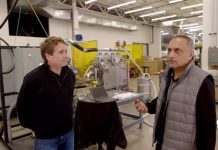Born in the 18th century, Sir Richard Arkwright was the definition of a self-made man during his time. He was one of the leading entrepreneurs during the Industrial Revolution and his organization skills helped him to be able to contribute to a number of different industries. Known as the “Father of the Industrial Revolution” in some circles, it is interesting to note that three of his major inventions of which he is credited had their patents overturned, including the spinning frame.
Arkwright does have other inventions that are fully his own. Here is an overview of the work he created:
The Rotary Carding Engine
Converting raw cotton buds into a continuous strand of fibers that could then be spun into yard was the purpose of the carding engine, which was initially invented in 1748. What Arkwright was able to do was create a carding engine that would crank and comb the webs from the carding engines and improve the spinning process with the use of the world’s first water-powered mill. His frame was so advanced for the time that the operators didn’t really even require any training to work the machine.
The Modern Factory
As Arkwright was able to produce more cotton yarn because of his improved processes, he was also able to grow his production levels as people turned to him for the better, cheaper end product that could be produced. By 1774, his firm employed over 600 workers and it continued to expand. To be able to keep up with production demands, he built the first modern factories so that all of his employees for one unit could be housed in one building.
One of his factories, which were located in Cromford, was so big that Arkwright realized he wouldn’t be able to get enough employees from the town to get his factory fully functional. To solve this problem, he built housing near the mill and built a public house that still stands today so that he could import workers. As he was doing this, he also encouraged large families that were in the weaving industry to move to Cromford and he would employ the entire family, sometimes hiring children as young as 7.
At his factories, which eventually employed over 35k workers, a 13 hour shift was worked each day. The work bell rang at 5am and 5pm and the gates would shut one hour later. If an employee was late, they couldn’t work that day and would lose an extra day’s pay.
History looks back at Arkwright as a shrewd businessman who was difficult to work with as he eventually bought out all of his partners. He was the high sheriff of Derbyshire and received initial credit for inventions, as evidence shows, because he could afford to file patents when others could not. His work, however, helped to change the way business was conducted and many of his thoughts are still used in some form today in the industrial sector.
That’s why Arkwright will always be the Father of the Industrial Revolution.
Strong proponent of individual liberty and free speech. My goal is to present information that expands our awareness of crucial issues and exposes the manufactured illusion of freedom that we are sold in America. Question everything because nothing is what it seems.




















